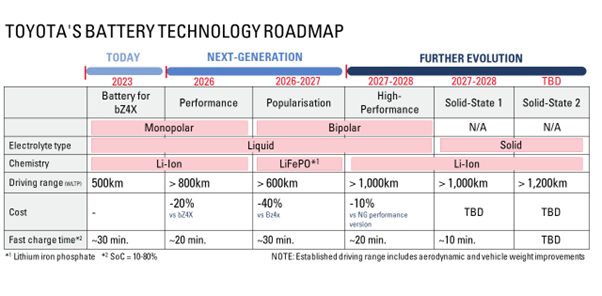Toyota has had an on-again off-again relationship with solid-state batteries for over a decade. Making plans to introduce such an energy storage device seems to be a priority right now, but still one in a “near-future” way and behind Chinese competitors.
This video explains the advantages and disadvantages of solid-state batteries, but be cautious in terms of its assessments. Several manufacturers have demonstrated capabilities that overshadow some ot the complaints here, as shown in recent blog entries.
Panasonic Takeover
As part of its immediate plans for battery development, Toyota is taking over its 28-year battery joint venture with Panasonic.
The Register reports, “For an undisclosed sum Primearth EV Energy (PEVE) will become a wholly owned subsidiary of Toyota beginning in late March in an effort to ‘strengthen its capabilities in mass-producing automotive batteries,’ according to the Japanese automaker.”
Already making prismatic nickel–metal hydride (Ni-MH) and lithium-ion (Li-ion) battery packs for Toyota’s hybrid and EV brands, PEVE will expand into tackle battery electric (BEV) and plug-in hybrid electric vehicles (PHEVs) for its new parent.
This joint venture will produce batteries alongside another Panasonic JV, Prime Planet Energy & Solutions (PPES), already supplying Toyota, and which the car maker pledged $2.5 billion to expand a PPES factory in North Carolina back in 2022. The final configuration of that factory will be a $13.9 billion facility, ready start delivering batteries in 2025.

Although seemingly behind very aggressive pushes by Chinese auto makers, Toyota is making huge investments to once again lead the market
Meanwhile in Indiana, Toyota is investing another $1.4 billion in a new factory to build three-row electric sports utility vehicles and battery pack assemblies to power the family-size vehicles. This will bring funding for Toyota Indiana to over $8 billion, a sign of Toyota’s expanding interest in American manufacturing and furthering battery development.
Change of Management
Nikkei Asia reports, “Akio Toyoda will step down as president and CEO on April 1 to be replaced by Chief Branding Officer Koji Sato, who has been tapped to “fully remodel” the automaker as a mobility company.” The first change in president for Toyota in 14 years seems to come simultaneously with a renewed interest battery-powered vehicles.
Toyoda, 66-and a member of the automaker’s founding family, will become chairman. He noted, “Sato is a man who has worked hard to master Toyota’s philosophy, techniques and manners in the field of car manufacturing,” adding that Sato, 53, “loves cars.”
Sato comes at a decisive time for the auto maker, as explained in this video, require unique approaches to chemistry.
New Battery Technology
Toyota is facing challenges from Japanese competitors and a growing Chinese domination of Asian markets as well as making inroads into European and American trade. With strong innovation in developing solid-state batteries, several Chinese firms seem to have a leading role at this time, but Toyota’s economic investments and strong development arm may help the company maintain market leadership.
The two videos featured here give as good a view of Toyota’s solid-state plans as they are willing to share. In any case, the firm seems intent on being a technology and market leader.

